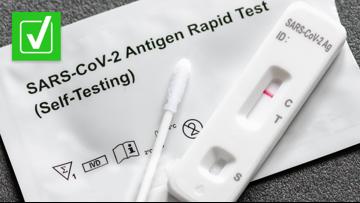The delta variant, which is more contagious than previous strains of COVID-19, has spread across the United States. The Centers for Disease Control and Prevention (CDC) estimates, as of July 31, the delta variant represents more than 90% of new COVID-19 infections.
Case counts have skyrocketed in the U.S. from about 12,000 cases a day in late June to more than 100,000 daily cases in early August, according to CDC data. With so many delta variant infections, Google Trends data shows there has been an increase in searches related to delta variant symptoms.
THE QUESTION
Are delta variant symptoms different than original COVID-19 symptoms?
THE SOURCES
- Dr. Gabe Kelen, professor and chair at Johns Hopkins University’s Department of Emergency Medicine
- Dr. Inci Yildirim, pediatric infectious disease specialist at Yale Medicine
- Baton Rouge General
- Centers for Disease Control and Prevention (CDC)
THE ANSWER
Yes, there is a slight difference in symptoms commonly linked to the delta variant. But many of the symptoms from the original COVID-19 strain have also been reported with the delta variant.
WHAT WE FOUND
The CDC has a long list of COVID-19 symptoms on its website, including fever or chills, cough, shortness of breath, and loss of taste or smell.
Dr. Gabe Kelen, professor and chair at Johns Hopkins University’s Department of Emergency Medicine, described the difference in symptoms between the delta variant and the original COVID-19 strain as “nuanced changes.”
“Meaning that you’re more likely to get headaches, sore throat, runny nose with the delta that we didn’t see as much, although you could get it with the previous strains,” he said.
In a Yale Medicine article, Dr. Inci Yildirim, a pediatric infectious disease specialist, said research surveys from the United Kingdom appear to show headache, sore throat, runny nose and fever are more common symptoms with the delta variant.
“It seems like cough and loss of smell are less common,” Yildirim said.
On its website, Baton Rouge General, a Louisiana hospital, also noted symptoms of the delta variant are slightly different than symptoms linked to the original coronavirus strain.
“Cough, loss of smell, nausea, vomiting, and diarrhea are less common with the delta variant, though they are still being reported in smaller numbers,” the hospital said. “The most common symptoms of the delta variant include sore throat, runny nose, headache, and fever.”
Kelen said it’s important for people to be aware of the symptoms of the delta variant so they don’t mistake the illness for something else.
“So, one of the worries about delta is that people will mistake it for a summer cold because it starts much like their colds,” he said. “Whereas the earlier strains that we're dealing with really sort of made you feel very flu-ish right from the start, meaning muscle aches and stomach aches and so forth.”
“The variety of symptoms that you can get are the same, it’s just a slight change in emphasis,” Kelen said.
Kelen, Yildirim and Baton Rouge General all said the best protection against the delta variant getting vaccinated. Kelen also said wearing masks indoors, regardless of your vaccination status, also helps protect against the delta variant.












